模块2 Unit 1 Tales of the unexplained reading部分知识点详解
文档属性
| 名称 | 模块2 Unit 1 Tales of the unexplained reading部分知识点详解 | 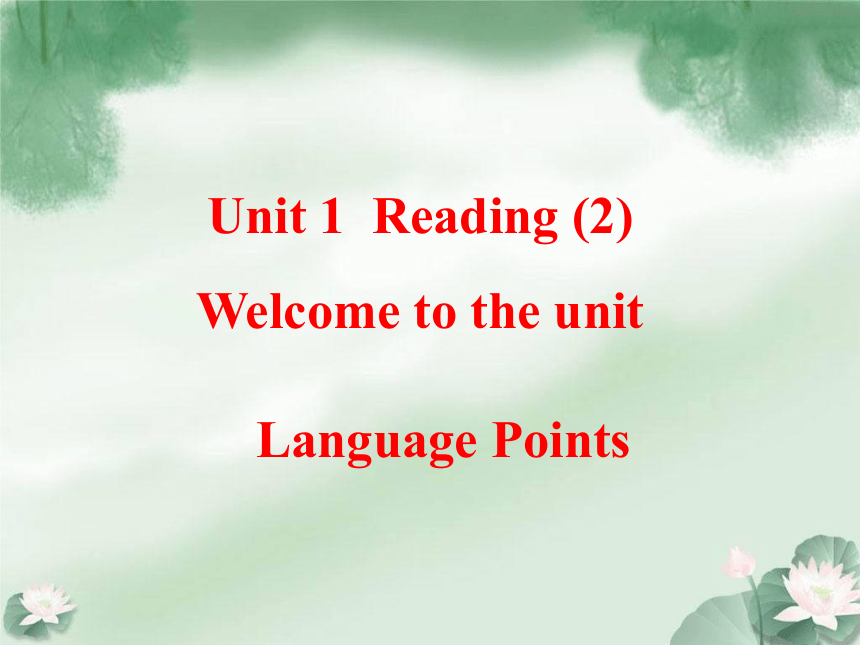 | |
| 格式 | zip | ||
| 文件大小 | 343.7KB | ||
| 资源类型 | 教案 | ||
| 版本资源 | 牛津译林版 | ||
| 科目 | 英语 | ||
| 更新时间 | 2012-12-13 18:15:16 | ||
图片预览

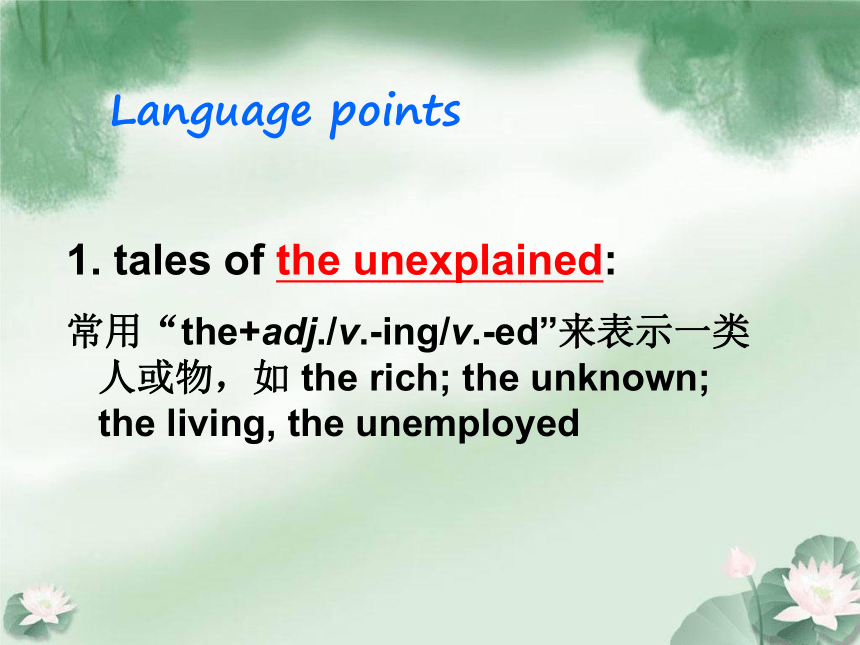
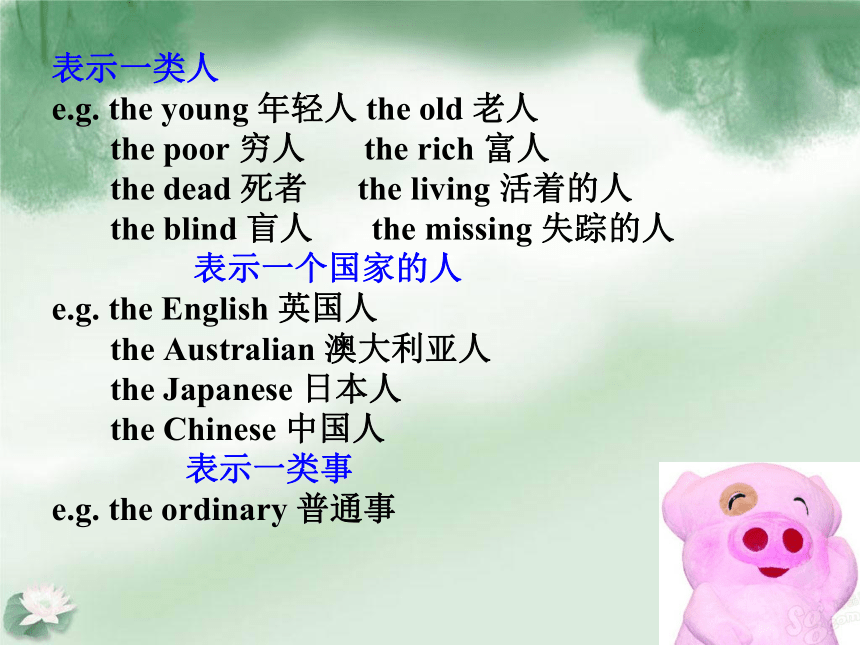
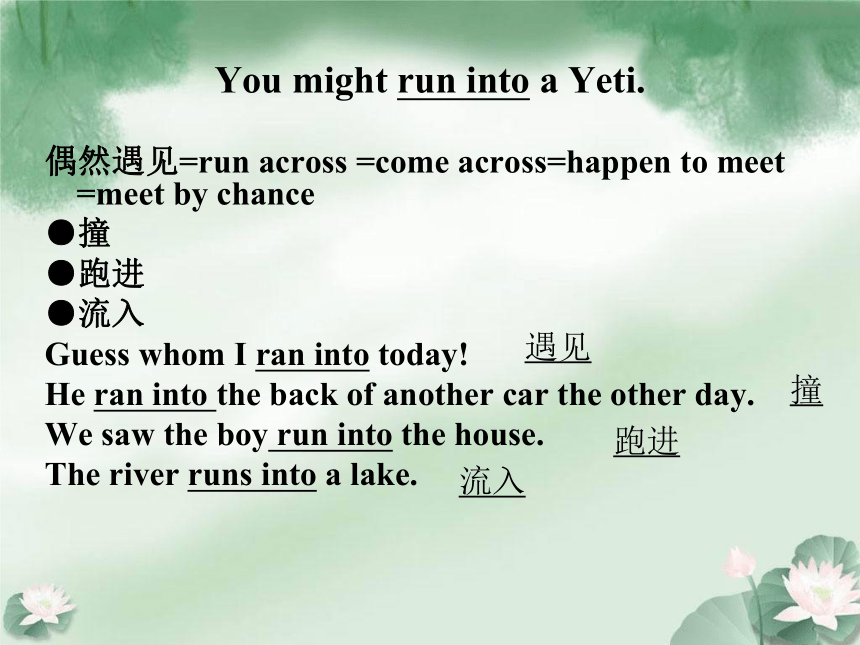
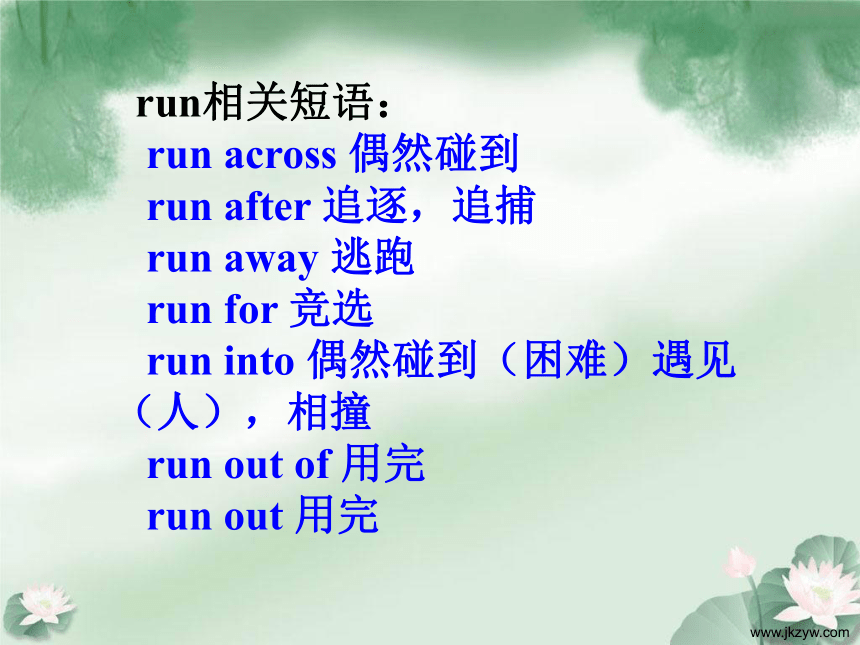
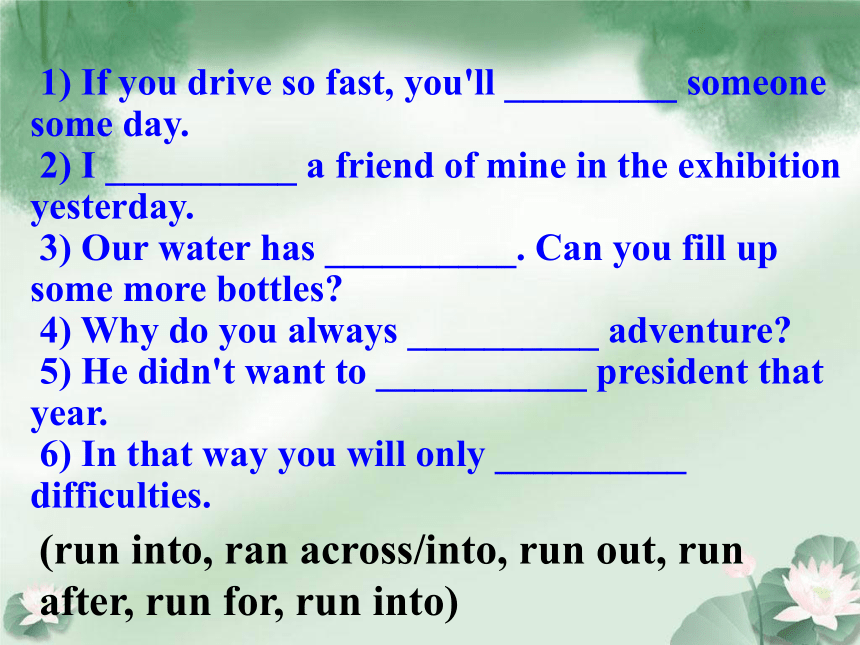
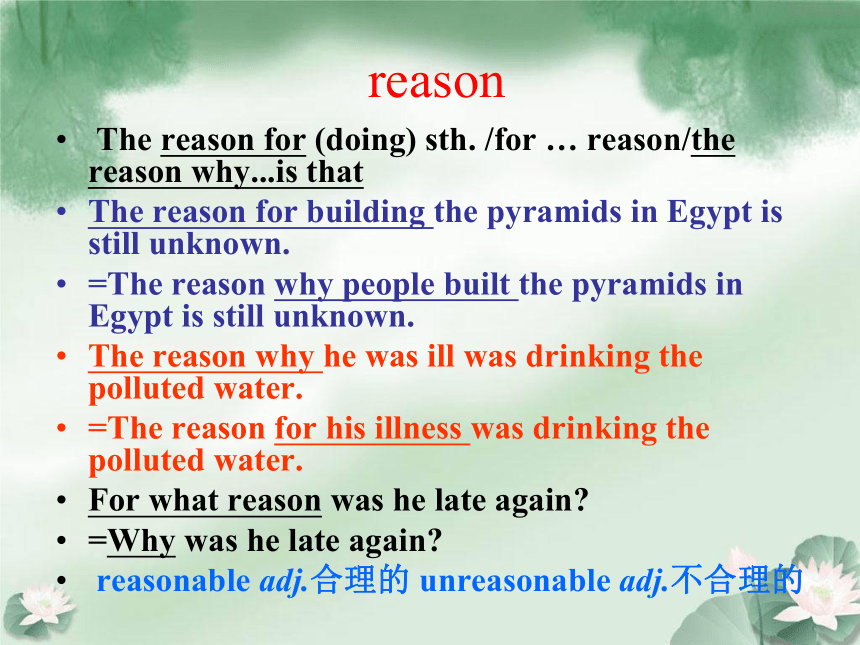
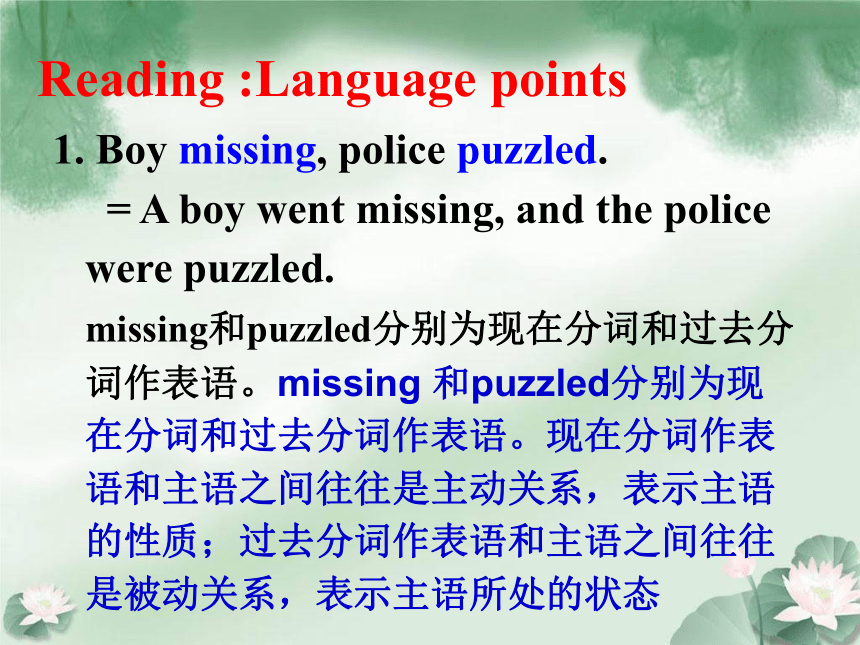
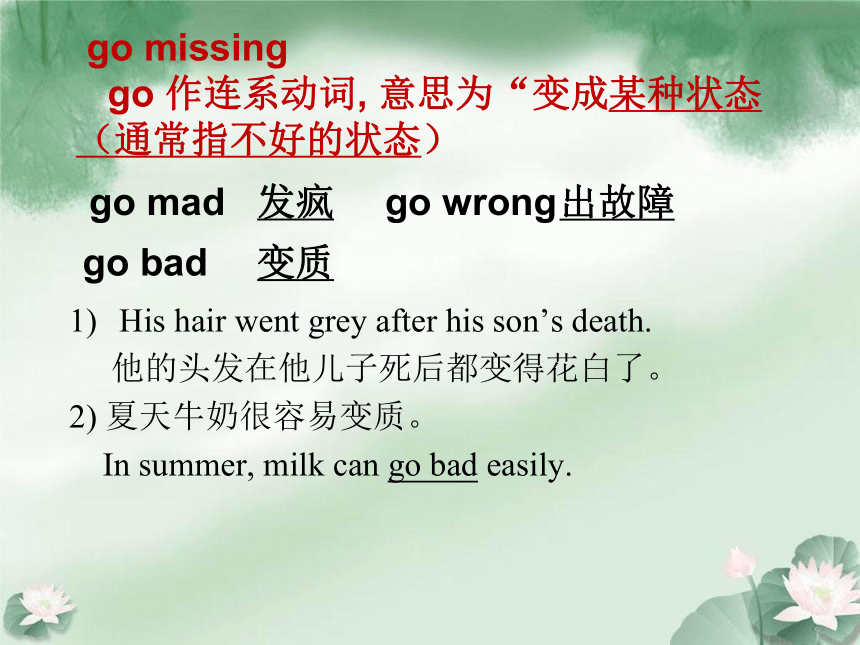
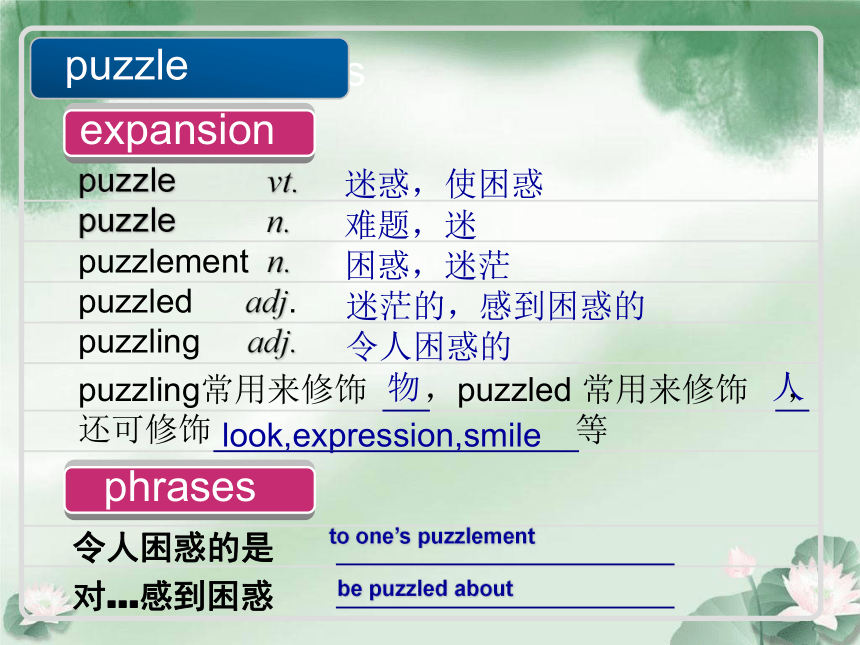
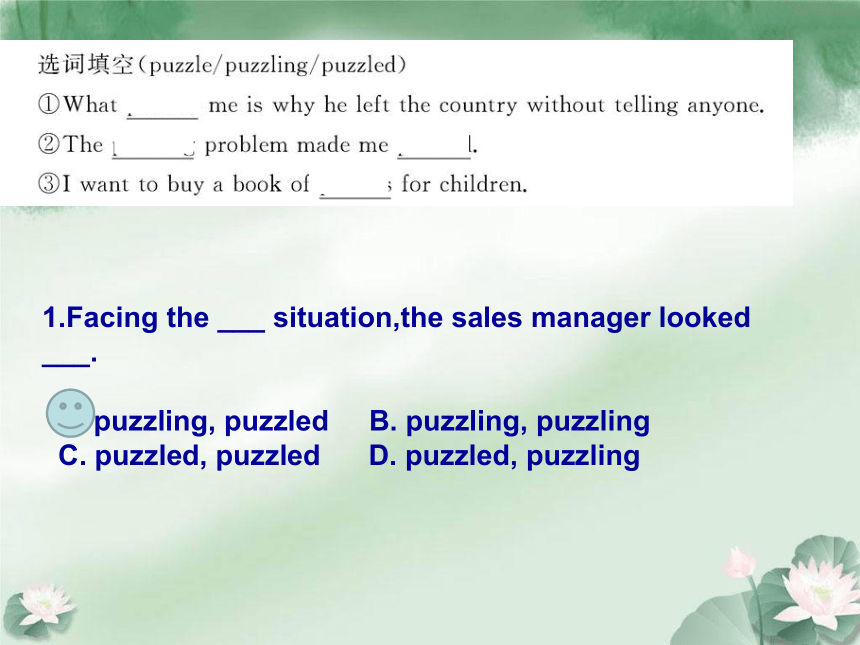
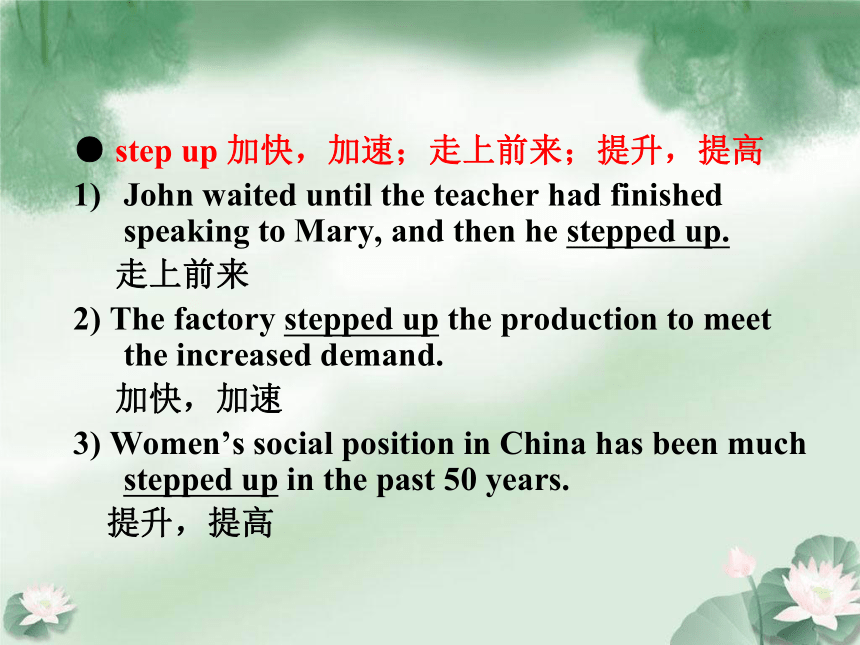
文档简介
课件41张PPT。Unit 1 Reading (2)
Welcome to the unit Language Points tales of the unexplained:
常用“the+adj./v.-ing/v.-ed”来表示一类人或物,如 the rich; the unknown; the living, the unemployed Language points表示一类人
e.g. the young 年轻人 the old 老人
the poor 穷人 the rich 富人
the dead 死者 the living 活着的人
the blind 盲人 the missing 失踪的人
表示一个国家的人
e.g. the English 英国人
the Australian 澳大利亚人
the Japanese 日本人
the Chinese 中国人
表示一类事
e.g. the ordinary 普通事
You might run into a Yeti.偶然遇见=run across =come across=happen to meet =meet by chance
●撞
●跑进
●流入
Guess whom I ran into today!
He ran into the back of another car the other day.
We saw the boy run into the house.
The river runs into a lake.遇见撞跑进流入 run相关短语:
run across 偶然碰到
run after 追逐,追捕
run away 逃跑
run for 竞选
run into 偶然碰到(困难)遇见(人),相撞
run out of 用完
run out 用完
www.jkzyw.com 1) If you drive so fast, you'll _________ someone some day.
2) I __________ a friend of mine in the exhibition yesterday.
3) Our water has __________. Can you fill up some more bottles?
4) Why do you always __________ adventure?
5) He didn't want to ___________ president that year.
6) In that way you will only __________ difficulties.
(run into, ran across/into, run out, run after, run for, run into) reason The reason for (doing) sth. /for … reason/the reason why...is that
The reason for building the pyramids in Egypt is still unknown.
=The reason why people built the pyramids in Egypt is still unknown.
The reason why he was ill was drinking the polluted water.
=The reason for his illness was drinking the polluted water.
For what reason was he late again?
=Why was he late again?
reasonable adj.合理的 unreasonable adj.不合理的Reading :Language points Boy missing, police puzzled.
= A boy went missing, and the police were puzzled.
missing和puzzled分别为现在分词和过去分词作表语。missing 和puzzled分别为现在分词和过去分词作表语。现在分词作表语和主语之间往往是主动关系,表示主语的性质;过去分词作表语和主语之间往往是被动关系,表示主语所处的状态His hair went grey after his son’s death.
他的头发在他儿子死后都变得花白了。
2) 夏天牛奶很容易变质。
In summer, milk can go bad easily.go mad发疯go wrong 出故障 go bad 变质 go missing
go 作连系动词, 意思为“变成某种状态(通常指不好的状态)puzzle vt.
puzzle n.
puzzlement n.
puzzled adj.
puzzling adj.
puzzling常用来修饰 ,puzzled 常用来修饰 ,还可修饰 等
物look,expression,smileKey words focus迷惑,使困惑难题,迷困惑,迷茫 迷茫的,感到困惑的 令人困惑的令人困惑的是
对…感到困惑be puzzled about to one’s puzzlement人1.Facing the ___ situation,the sales manager looked ___.
A. puzzling, puzzled B. puzzling, puzzling
C. puzzled, puzzled D. puzzled, puzzling● step up 加快,加速;走上前来;提升,提高
John waited until the teacher had finished speaking to Mary, and then he stepped up.
走上前来
2) The factory stepped up the production to meet the increased demand.
加快,加速
3) Women’s social position in China has been much stepped up in the past 50 years.
提升,提高● step 词汇拓展:
take a step forward/back 向前走/向后走
take steps/action/measures to do sth.
采取步骤、行动、措施做某事
mind/ watch your step 小心谨慎,谨慎从事
step by step 一步一步,逐渐地,逐步地
keep/ be in step with 与……保持同步,跟上……的步伐
follow in one’s steps 踏着某人的足迹; 步某人的后尘; 效法某人● search n. vi & vt. 搜索,搜查,搜寻
search sb./sp. for sth.在某人身上/某处搜查某物
search sb./sp. 搜某人的身或搜查某处
search for sb./sth. 搜寻某人或某事物
search through 查遍
search out 搜(查)出, 探出
in search of/in one’s search for 寻找The police have _______ the thief for
several days, and now they are _____
the station.
A. searched, searching
B. searched for, searched for
C. searched for; searching
D. searched; searched for a fifteen-year-old boynum.-n(-adj.):形容词
five-minute; 8-meter-long, one-way 单行的
(注意:复数时,单位名词仍不加s)。
拓展:
narrow-minded 心胸狭窄的, absent-minded 心不在焉的 old-fashioned 过时的, bare-footed 赤脚的。
peace-loving 爱好和平的, time-saving省时间的 English-speaking说英语的
This incident has received great interest due to reports of strange lights in the sky …
● interest: n.兴趣,爱好;利益;利息 v. 使……感兴趣
have /find/feel/show/take (an/no) interest in …
对……有/无兴趣
develop (one’s) interest in 培养对……的兴趣
arouse one’s interest in … 激发对……的兴趣
lose interest (in) (对……)失去兴趣
in the interest(s) of sb./sth.
为了某人的利益; 为某事的缘故
a question of common interest 共同关心的问题
the interest rate 利率
be/become interested in … due to 由于,因为(可作状语和表语)
近义短语:because of/owing to/on account of/thanks to多亏,幸亏/as a result of …的结果(只作状语)1.because of意为"由于,因为",在句中仅作状语,修饰句中的一部分,与其他成分不用逗号隔开。Eg. 我们决不可因为这样一个小小的挫折而灰心丧气。 We must not get discouraged because of such a minor setback. 2. owing to与because of一样,除作状语外,也可作表语。作状语时修饰整个句子,可在句首或句末,用逗号隔开。
如:They decided to cancel the flight,owing to the storm.
由于这场暴风雨,他们决定取消这个航班。 His death was owing to an accident.他死于一场事故。 3. due to引出造成后果的原因,在句中作表语、状语和定语。作表语和状语时与owing to同义,作状语时,一般不与其他成分隔开。如:
This accident was due to(owing to)his careless driving.
这次车祸是由于他开车疏忽大意造成的。
He arrived late due to(owing to)the storm.由于暴风雨他来晚了。
Mistakes due to carelessness may have serious consequences.
由于疏忽大意造成的错误可能带来严重的后果。
4.on account of 语气较为正式。可作状语、表语,不作定语。
He could not come on account of his illness.他因病不能前来due 还有其他含义(adj.):
1) 到期(应偿付,付给)
The electricity bill is due tomorrow.
电费明天到期。
2) 定于(某时)到达/做某事
Our train is due in Paris at 2 p.m.
我们的火车下午两点到达巴黎。Justin Foster, a high school student, was last seen Friday night.
● 同位语:一个名词(或其它形式)对另一个名词或代词进行修饰、限定或说明,这个名词(或其它形式)就是同位语。同位语与被它限定的词的格要一致,并常常紧挨在一起。 He himself told me that his brother John is a world-famous doctor.
2) They each have an English-English dictionary.
3) He always works hard even if he knows the fact that he is not in good health.
4) His failure was due to the fact that he had not practised for a long time.
5) Mary, monitor of our class, was invited to the party too. 用同位语合并下列句子 Mr. Smith is our new English teacher. He is very kind to us.
—Mr. Smith, our new English teacher, is very kind to us.
2) Yesterday I met Tom. Tom is a friend of my brother's.
—Yesterday I met Tom, a friend of my brother's.
3) Mr. James is my English teacher. Yesterday I talked to him.
—Yesterday I talked to my English teacher, Mr. James. 4) We are Chinese people and we are brave and hardworking.
—We Chinese people are brave and hardworking.
5) He didn’t work hard. He failed the exam.
—He failed the exam due to the fact that he didn’t work hard. ●see+sb./sth.+ do/doing/done:
watch, look at, hear, listen to , notice, feel ,observe; have(使,让)等动词与see有这种相同用法。
1) I pulled back the curtains and saw a large spaceship flying outside.
我拉开窗帘看见一个巨大的宇宙飞船正在外面飞行。Translation:2) 我看见他进了那家饭店。
I saw him go into the restaurant.
3)有人看见他一小时前离开了。
He was seen to leave an hour ago.
4)看到儿子在托儿所受到很好的照顾,我很高兴。
I’m very glad to see my son taken good care of in the nursery.
ready adj.准备好的
be/get/make ready for sth 为某事做好准备
be ready to do sth 准备好做某事;欣然做某事;眼看就要做某事;易于,有....的倾向
Everything is ready for the party.
The soliders are ready to die for their country.
The baby was ready to cry.
She's ready to argue.她总是喜欢争论。
I didn’t see him but I heard him put on
his favorite CD. (P2, lines 24-26) put on 在此表示“打开(= turn on)”,此外还有“穿上”;“上演”;“增加”等含义。put on a coat
put on weight
put on the light/radio/television
put on a record
put on a wounded expression
put on performances
穿上增加打开使开始播放假装,伪装表演,上演7. Standing inside were lots of strange creatures with white skin and large black eyes. (这是一个倒装句)
=Lots of strange creatures with white skin and large black eyes were standing inside.
● 本句倒装句结构是:表语+be+主语
Sitting /Seated at the back of the room was a shy girl with two big eyes.
Also present at the meeting was a professor from Peking University.
那个湖周围种着各种各样的树。
Growing around the lake are trees of different kinds.倒装句常见句型归纳: 1) 地点状语/时间状语+谓语(vi.)+主语, 但主语为代词时不能用倒装。
Here comes the bus./ South of the city lies a big shoe factory./Here it is./Now comes your turn.
2) (半)否定词+助动词/be+主语
(半)否定词如neither; nor; not until …; never; seldom; hardly … when …; no sooner … than …;; by no means …
Eg.直到昨天我才知道这条消息。
Not until yesterday did I get the news.
我刚到公共汽车站,汽车就开了
Hardly had I got to the bus stop when the bus started.
No sooner had I got to the bus stop than the bus started.3) So(如此)+adj./adv.+助动词/be+主语; so+助动词/be+主语(……也这样); so +主语+助动词/be (……是这样的)
So excited were we at that time that we didn’t know what to say.
Mary works hard and so does her partner.
A: Mary works very hard.
B: So she does.
4) only+状语+助动词/be/情态动词+主语
Only in this way can the medicine work well .倒装句练习
Not until I began to work _____ how much time I had wasted.
A. didn't I realize B. did I realize
C. I didn't realize D. I realized (MET 90)
4. Did you enjoy the trip?" "I'm afraid not. And _____."
A. my classmates don't either
B. my classmates don't too
C. neither do my classmates
D. neither did my classmates (MET 85)
5.Little _____ about his own safety, though he was in great danger himself.
A. does he care B. did he care
C. he cares D. he cared (上海 94)
occur Vi 发生,存在 (无被动时态)
过去分词occurred 现在分词occurring 名词occurrence
When did the accident occur?
拓展:
(1)occur to(主意或想法突然)浮现在脑中,被想起,被想到。
Just then an idea occured to me.
(2)It occurs to sb that 某人想到...
Just as I was leaving the house, it occurred to me that I had forgotten my keys.
happen
Vi
(1)碰巧,此时不能用进行时态,
happen to do It happend that
I happened to be out when he came.
It happened that the famous actor was her brother.
(2)(尤指偶然)发生,出现
Accidents like this happen all the time.
The aliens took me away so that they could do research on me.
● so that引导目的状语从句时,从句中须有情态动词;引导结果状语从句时,从句中不用情态动词。
I got up early this morning so that I could catch the early bus.(以便,为了)
I got up late this morning so that I missed the early bus. (结果) ● case n. 情况,状况;事例;病例;案件;个案;箱;盒
in this/that case
three cases of fever
a typical case
a civil(公民的,民间的) case
a suitcase (箱;盒)in case 后接从句:以防万一;万一
In case that it rains, you'd better take an umbrella.
以防下雨,你最好带上一把雨伞。
in case of + sth: 若某事发生;假如
In case of fire, you must keep calm and call 119.
假如遇上火警,你必须保持镇静及打119报火警。
in no case 在任何情况下绝不,无论如何都不
in any case 无论如何,总之
● make up
She made up her face to look prettier.
The boy made up a story; it was not true.
3) make up the bed for our guest.
4) 30 boys and 21 girls make up our class.
Our class is made up of 30 boys and 21 girls.
5) Hard work can make up for a lack of intelligence(聪明,才智). 组成编造给……铺床化妆弥补not until
由 not until 引导的时间状语从句位于句首时,主句应部分倒装,从句语序不变。如:
Not until 1998 did he return to his hometown.
直到 1998 年他才回到家乡。
Not until Father came back did we begin to have supper last night.
昨晚直到父亲回来,我们才开始吃晚饭。
注意:当 not until 引导的状语或状语从句用于强调句型时,句子的主语不倒装。如将上两句改为强调句应为:
其基本句型为:
It is (was) not until (时间状语) that
It was not until Father came back that we began to have supper last night.
Welcome to the unit Language Points tales of the unexplained:
常用“the+adj./v.-ing/v.-ed”来表示一类人或物,如 the rich; the unknown; the living, the unemployed Language points表示一类人
e.g. the young 年轻人 the old 老人
the poor 穷人 the rich 富人
the dead 死者 the living 活着的人
the blind 盲人 the missing 失踪的人
表示一个国家的人
e.g. the English 英国人
the Australian 澳大利亚人
the Japanese 日本人
the Chinese 中国人
表示一类事
e.g. the ordinary 普通事
You might run into a Yeti.偶然遇见=run across =come across=happen to meet =meet by chance
●撞
●跑进
●流入
Guess whom I ran into today!
He ran into the back of another car the other day.
We saw the boy run into the house.
The river runs into a lake.遇见撞跑进流入 run相关短语:
run across 偶然碰到
run after 追逐,追捕
run away 逃跑
run for 竞选
run into 偶然碰到(困难)遇见(人),相撞
run out of 用完
run out 用完
www.jkzyw.com 1) If you drive so fast, you'll _________ someone some day.
2) I __________ a friend of mine in the exhibition yesterday.
3) Our water has __________. Can you fill up some more bottles?
4) Why do you always __________ adventure?
5) He didn't want to ___________ president that year.
6) In that way you will only __________ difficulties.
(run into, ran across/into, run out, run after, run for, run into) reason The reason for (doing) sth. /for … reason/the reason why...is that
The reason for building the pyramids in Egypt is still unknown.
=The reason why people built the pyramids in Egypt is still unknown.
The reason why he was ill was drinking the polluted water.
=The reason for his illness was drinking the polluted water.
For what reason was he late again?
=Why was he late again?
reasonable adj.合理的 unreasonable adj.不合理的Reading :Language points Boy missing, police puzzled.
= A boy went missing, and the police were puzzled.
missing和puzzled分别为现在分词和过去分词作表语。missing 和puzzled分别为现在分词和过去分词作表语。现在分词作表语和主语之间往往是主动关系,表示主语的性质;过去分词作表语和主语之间往往是被动关系,表示主语所处的状态His hair went grey after his son’s death.
他的头发在他儿子死后都变得花白了。
2) 夏天牛奶很容易变质。
In summer, milk can go bad easily.go mad发疯go wrong 出故障 go bad 变质 go missing
go 作连系动词, 意思为“变成某种状态(通常指不好的状态)puzzle vt.
puzzle n.
puzzlement n.
puzzled adj.
puzzling adj.
puzzling常用来修饰 ,puzzled 常用来修饰 ,还可修饰 等
物look,expression,smileKey words focus迷惑,使困惑难题,迷困惑,迷茫 迷茫的,感到困惑的 令人困惑的令人困惑的是
对…感到困惑be puzzled about to one’s puzzlement人1.Facing the ___ situation,the sales manager looked ___.
A. puzzling, puzzled B. puzzling, puzzling
C. puzzled, puzzled D. puzzled, puzzling● step up 加快,加速;走上前来;提升,提高
John waited until the teacher had finished speaking to Mary, and then he stepped up.
走上前来
2) The factory stepped up the production to meet the increased demand.
加快,加速
3) Women’s social position in China has been much stepped up in the past 50 years.
提升,提高● step 词汇拓展:
take a step forward/back 向前走/向后走
take steps/action/measures to do sth.
采取步骤、行动、措施做某事
mind/ watch your step 小心谨慎,谨慎从事
step by step 一步一步,逐渐地,逐步地
keep/ be in step with 与……保持同步,跟上……的步伐
follow in one’s steps 踏着某人的足迹; 步某人的后尘; 效法某人● search n. vi & vt. 搜索,搜查,搜寻
search sb./sp. for sth.在某人身上/某处搜查某物
search sb./sp. 搜某人的身或搜查某处
search for sb./sth. 搜寻某人或某事物
search through 查遍
search out 搜(查)出, 探出
in search of/in one’s search for 寻找The police have _______ the thief for
several days, and now they are _____
the station.
A. searched, searching
B. searched for, searched for
C. searched for; searching
D. searched; searched for a fifteen-year-old boynum.-n(-adj.):形容词
five-minute; 8-meter-long, one-way 单行的
(注意:复数时,单位名词仍不加s)。
拓展:
narrow-minded 心胸狭窄的, absent-minded 心不在焉的 old-fashioned 过时的, bare-footed 赤脚的。
peace-loving 爱好和平的, time-saving省时间的 English-speaking说英语的
This incident has received great interest due to reports of strange lights in the sky …
● interest: n.兴趣,爱好;利益;利息 v. 使……感兴趣
have /find/feel/show/take (an/no) interest in …
对……有/无兴趣
develop (one’s) interest in 培养对……的兴趣
arouse one’s interest in … 激发对……的兴趣
lose interest (in) (对……)失去兴趣
in the interest(s) of sb./sth.
为了某人的利益; 为某事的缘故
a question of common interest 共同关心的问题
the interest rate 利率
be/become interested in … due to 由于,因为(可作状语和表语)
近义短语:because of/owing to/on account of/thanks to多亏,幸亏/as a result of …的结果(只作状语)1.because of意为"由于,因为",在句中仅作状语,修饰句中的一部分,与其他成分不用逗号隔开。Eg. 我们决不可因为这样一个小小的挫折而灰心丧气。 We must not get discouraged because of such a minor setback. 2. owing to与because of一样,除作状语外,也可作表语。作状语时修饰整个句子,可在句首或句末,用逗号隔开。
如:They decided to cancel the flight,owing to the storm.
由于这场暴风雨,他们决定取消这个航班。 His death was owing to an accident.他死于一场事故。 3. due to引出造成后果的原因,在句中作表语、状语和定语。作表语和状语时与owing to同义,作状语时,一般不与其他成分隔开。如:
This accident was due to(owing to)his careless driving.
这次车祸是由于他开车疏忽大意造成的。
He arrived late due to(owing to)the storm.由于暴风雨他来晚了。
Mistakes due to carelessness may have serious consequences.
由于疏忽大意造成的错误可能带来严重的后果。
4.on account of 语气较为正式。可作状语、表语,不作定语。
He could not come on account of his illness.他因病不能前来due 还有其他含义(adj.):
1) 到期(应偿付,付给)
The electricity bill is due tomorrow.
电费明天到期。
2) 定于(某时)到达/做某事
Our train is due in Paris at 2 p.m.
我们的火车下午两点到达巴黎。Justin Foster, a high school student, was last seen Friday night.
● 同位语:一个名词(或其它形式)对另一个名词或代词进行修饰、限定或说明,这个名词(或其它形式)就是同位语。同位语与被它限定的词的格要一致,并常常紧挨在一起。 He himself told me that his brother John is a world-famous doctor.
2) They each have an English-English dictionary.
3) He always works hard even if he knows the fact that he is not in good health.
4) His failure was due to the fact that he had not practised for a long time.
5) Mary, monitor of our class, was invited to the party too. 用同位语合并下列句子 Mr. Smith is our new English teacher. He is very kind to us.
—Mr. Smith, our new English teacher, is very kind to us.
2) Yesterday I met Tom. Tom is a friend of my brother's.
—Yesterday I met Tom, a friend of my brother's.
3) Mr. James is my English teacher. Yesterday I talked to him.
—Yesterday I talked to my English teacher, Mr. James. 4) We are Chinese people and we are brave and hardworking.
—We Chinese people are brave and hardworking.
5) He didn’t work hard. He failed the exam.
—He failed the exam due to the fact that he didn’t work hard. ●see+sb./sth.+ do/doing/done:
watch, look at, hear, listen to , notice, feel ,observe; have(使,让)等动词与see有这种相同用法。
1) I pulled back the curtains and saw a large spaceship flying outside.
我拉开窗帘看见一个巨大的宇宙飞船正在外面飞行。Translation:2) 我看见他进了那家饭店。
I saw him go into the restaurant.
3)有人看见他一小时前离开了。
He was seen to leave an hour ago.
4)看到儿子在托儿所受到很好的照顾,我很高兴。
I’m very glad to see my son taken good care of in the nursery.
ready adj.准备好的
be/get/make ready for sth 为某事做好准备
be ready to do sth 准备好做某事;欣然做某事;眼看就要做某事;易于,有....的倾向
Everything is ready for the party.
The soliders are ready to die for their country.
The baby was ready to cry.
She's ready to argue.她总是喜欢争论。
I didn’t see him but I heard him put on
his favorite CD. (P2, lines 24-26) put on 在此表示“打开(= turn on)”,此外还有“穿上”;“上演”;“增加”等含义。put on a coat
put on weight
put on the light/radio/television
put on a record
put on a wounded expression
put on performances
穿上增加打开使开始播放假装,伪装表演,上演7. Standing inside were lots of strange creatures with white skin and large black eyes. (这是一个倒装句)
=Lots of strange creatures with white skin and large black eyes were standing inside.
● 本句倒装句结构是:表语+be+主语
Sitting /Seated at the back of the room was a shy girl with two big eyes.
Also present at the meeting was a professor from Peking University.
那个湖周围种着各种各样的树。
Growing around the lake are trees of different kinds.倒装句常见句型归纳: 1) 地点状语/时间状语+谓语(vi.)+主语, 但主语为代词时不能用倒装。
Here comes the bus./ South of the city lies a big shoe factory./Here it is./Now comes your turn.
2) (半)否定词+助动词/be+主语
(半)否定词如neither; nor; not until …; never; seldom; hardly … when …; no sooner … than …;; by no means …
Eg.直到昨天我才知道这条消息。
Not until yesterday did I get the news.
我刚到公共汽车站,汽车就开了
Hardly had I got to the bus stop when the bus started.
No sooner had I got to the bus stop than the bus started.3) So(如此)+adj./adv.+助动词/be+主语; so+助动词/be+主语(……也这样); so +主语+助动词/be (……是这样的)
So excited were we at that time that we didn’t know what to say.
Mary works hard and so does her partner.
A: Mary works very hard.
B: So she does.
4) only+状语+助动词/be/情态动词+主语
Only in this way can the medicine work well .倒装句练习
Not until I began to work _____ how much time I had wasted.
A. didn't I realize B. did I realize
C. I didn't realize D. I realized (MET 90)
4. Did you enjoy the trip?" "I'm afraid not. And _____."
A. my classmates don't either
B. my classmates don't too
C. neither do my classmates
D. neither did my classmates (MET 85)
5.Little _____ about his own safety, though he was in great danger himself.
A. does he care B. did he care
C. he cares D. he cared (上海 94)
occur Vi 发生,存在 (无被动时态)
过去分词occurred 现在分词occurring 名词occurrence
When did the accident occur?
拓展:
(1)occur to(主意或想法突然)浮现在脑中,被想起,被想到。
Just then an idea occured to me.
(2)It occurs to sb that 某人想到...
Just as I was leaving the house, it occurred to me that I had forgotten my keys.
happen
Vi
(1)碰巧,此时不能用进行时态,
happen to do It happend that
I happened to be out when he came.
It happened that the famous actor was her brother.
(2)(尤指偶然)发生,出现
Accidents like this happen all the time.
The aliens took me away so that they could do research on me.
● so that引导目的状语从句时,从句中须有情态动词;引导结果状语从句时,从句中不用情态动词。
I got up early this morning so that I could catch the early bus.(以便,为了)
I got up late this morning so that I missed the early bus. (结果) ● case n. 情况,状况;事例;病例;案件;个案;箱;盒
in this/that case
three cases of fever
a typical case
a civil(公民的,民间的) case
a suitcase (箱;盒)in case 后接从句:以防万一;万一
In case that it rains, you'd better take an umbrella.
以防下雨,你最好带上一把雨伞。
in case of + sth: 若某事发生;假如
In case of fire, you must keep calm and call 119.
假如遇上火警,你必须保持镇静及打119报火警。
in no case 在任何情况下绝不,无论如何都不
in any case 无论如何,总之
● make up
She made up her face to look prettier.
The boy made up a story; it was not true.
3) make up the bed for our guest.
4) 30 boys and 21 girls make up our class.
Our class is made up of 30 boys and 21 girls.
5) Hard work can make up for a lack of intelligence(聪明,才智). 组成编造给……铺床化妆弥补not until
由 not until 引导的时间状语从句位于句首时,主句应部分倒装,从句语序不变。如:
Not until 1998 did he return to his hometown.
直到 1998 年他才回到家乡。
Not until Father came back did we begin to have supper last night.
昨晚直到父亲回来,我们才开始吃晚饭。
注意:当 not until 引导的状语或状语从句用于强调句型时,句子的主语不倒装。如将上两句改为强调句应为:
其基本句型为:
It is (was) not until (时间状语) that
It was not until Father came back that we began to have supper last night.
